|
|
|
Sort Order |
|
|
|
Items / Page
|
|
|
|
|
|
|
| Srl | Item |
| 1 |
ID:
110149
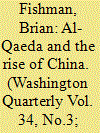

|
|
|
| 2 |
ID:
139157
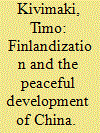

|
|
|
|
|
| Summary/Abstract |
The rise of China has brought about new considerations and a debate in East Asian security studies. Several of the countries neighbouring China have been probed for their degree of ‘Finlandization’, as manifest in excessive attentiveness to the interests of a neighbouring great power, due to the power asymmetry between the ‘Finlandized’ and the ‘Finlandizer’. This article will scrutinize Finlandization and determine to what extent the power relationship between Finland and the Soviet Union can be compared with the emerging power relationship that China’s East Asian neighbours will have to tackle. Furthermore, this article will seek from the Finnish experience lessons for East Asia on how to adapt to power realities without making the mistakes that Finland and the Soviet Union made in their relationship. China’s East Asian neighbours could learn how to avoid compromising their autonomy from Finland’s mistakes. They could also learn from Finnish realism how to tackle the security dilemma that the rise of Chinese power involves, and how to seek security in a way that would not make the rising great power feel any less secure.
|
|
|
|
|
|
|
|
|
|
|
|
|
|
|
|
| 3 |
ID:
125372
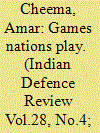

|
|
|
|
|
| Publication |
2013.
|
| Summary/Abstract |
Realpolitik dictates a policy of 'congagement' of China and explains America's reasons for accommodating the former at the grand table. Thus, while the US-Chinese relationship is expected to remain the 'most important,' it is only to the point that the overall balance of power and global primacy remains with USA. Thus, while economics dictates that business can be done as usual, the USA would attempt to limit Chinese power projection capability thereby challenging the status quo in the Asia-Pacific region. The desire to do this by greater and more robust collaboration with established and new allies/partners is the underlying theme of the US re-balancing and is 'pre-emptive' in nature.
|
|
|
|
|
|
|
|
|
|
|
|
|
|
|
|
| 4 |
ID:
158859
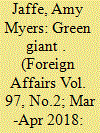

|
|
|
|
|
| Summary/Abstract |
In 1997, in need of increasing oil and gas imports to fuel its accel [1]erating economy [1], China launched a new energy policy. Intent on replicating Washington’s close relationships with large oil-producing countries, its diplomats toured oil-state capitals, offering investment and arms in exchange for guaranteed supplies. Of particular interest were governments that had been ostracized by Western powers—an opening, Beijing believed, that would allow it to level the energy playing field with the United States and have the added benefit of fueling conflicts that would distract the U.S. military just as it was trying to refocus on Asia.
|
|
|
|
|
|
|
|
|
|
|
|
|
|
|
|
| 5 |
ID:
132119
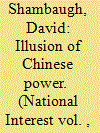

|
|
|
|
|
| Publication |
2014.
|
| Summary/Abstract |
CONVENTIONAL WISDOM has it that the China juggernaut is unstoppable and that the world must adjust to the reality of the Asian giant as a-perhaps the-major global power. A mini-industry of "China rise" prognosticators has emerged over the past decade, all painting a picture of a twenty-first-century world in which China is a dominant actor. This belief is understandable and widespread-but wrong.
|
|
|
|
|
|
|
|
|
|
|
|
|
|
|
|
| 6 |
ID:
178112
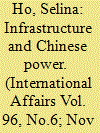

|
|
|
|
|
| Summary/Abstract |
China's increasing material capabilities stand at the heart of the US–China power transition debate. The focus on material power reflects a realist definition of power based on the possession of resources. However, material capabilities do not necessarily translate into influence and do not always determine outcomes. Non-material power matters at least as much as material capabilities. This article argues that China under President Xi Jinping views power differently from previous generations of Chinese leaders. While material power remains important, Xi has paid greater attention to strengthening Chinese non-material power, in particular structural power and discursive power. This article examines Chinese structural and discursive power, the third and fourth faces of power, through the lens of Xi's mega-infrastructure vision, the Belt and Road Initiative (BRI). It argues that power, both material and non-material, is embedded in infrastructure. Specifically, the article uses case-studies of Chinese construction of high-speed railways in Laos and Indonesia to illustrate the effects of Chinese structural and discursive power. Based on field work and in-depth interviews, the cases show that China is relatively successful in wielding structural and discursive power in Laos and Indonesia, despite the differences in the two countries’ political systems, and economic and population sizes. Chinese domination, however, does not mean that subordinate states do not have agency. For instance, there is resistance against the narrative of a pre-eminent Chinese civilization in Chinese discourse, as the Indonesia case demonstrates. Exploring the different facets of Chinese power is critical for a proper understanding of how China strives to shape the structure and discourse of the global order.
|
|
|
|
|
|
|
|
|
|
|
|
|
|
|
|
| 7 |
ID:
098167
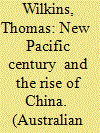

|
|
|
|
|
| Publication |
2010.
|
| Summary/Abstract |
The re-emergence of the 'Pacific Century', or 'Asia-Pacific Century', discourse centred on the rise of Chinese power raises important questions in the discipline of international relations (IR). These questions relate to the conceptualisation of the Pacific Century discourse, its application to the contemporary empirical case, and its relationship and amenability to IR theories. In order to address these questions, the article subjects the concept of a 'Pacific Century' to critical analysis through the synergy of three pertinent 'debates'. First, it creates a novel analytical framework to define and codify the parameters of the Pacific Century debate; a discourse that has until now remained diffuse and inchoate. Second, it engages with the present 'great debate' in IR between the traditional/rationalist and critical/reflectivist approaches, applying them in juxtaposition to the notion of a 'new' Pacific Century, led by China. Thirdly, then, the article speaks to the 'rising China' debate, which currently captivates commentators both in academic and policy-making circles. The article explores how the 'Pacific Century' concept is a compound of both ideational and material factors: it is at once both a political/ideological project and a reified intellectual frame of reference. Through this multidimensional analysis, the article aims to shape the re-emerging debate on the Pacific Century, affirm the enduring value of the term, and demonstrate the efficacy of IR theories in deconstructing conceptual problems.
|
|
|
|
|
|
|
|
|
|
|
|
|
|
|
|
| 8 |
ID:
123007
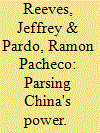

|
|
|
|
|
| Publication |
2013.
|
| Summary/Abstract |
This article draws on Michael Barnett and Raymond Duvall's power typology to examine Chinese power in Sino-Mongolia and Sino-North Korean relations. Using compulsory, institutional, productive, and structural power to frame these bilateral relations, this article looks at the means by which China obtains power and how it utilizes power in relation to Mongolia and the Democratic People's Republic of Korea. This article also examines Mongolian and North Korean perceptions and responses to Chinese power. Concurrently, the article considers the Barnett/Duvall model's applicability to China's relations with other periphery developing states.
|
|
|
|
|
|
|
|
|
|
|
|
|
|
|
|
| 9 |
ID:
133415
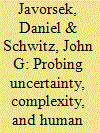

|
|
|
|
|
| Publication |
2014.
|
| Summary/Abstract |
Geopolitical dynamics associated with nuclear proliferation, the Arab Spring, the rapid rise of Chinese power, an oil-fueled Russian resurgence, and the post-Afghan and Iraq eras will demand significant changes in intelligence focus, processes, and resources. Nearly a decade after intelligence failures required a restructuring of the Intelligence Community with mandates for a scientific approach to intelligence analysis, current efforts continue to focus on overly deterministic individual analyst methods. We argue for a process-oriented approach to analysis resembling the collaborative scientific process successful in other professions that is built on shared theory and models. After demonstrating that events in the real world are path dependent and contingent on deterministic and random elements, we highlight the role of uncertainty in intelligence analysis with specific emphasis on intelligence failures. We then describe how human agency in an interconnected and interdependent system leads to a landscape of dancing strategies as agents dynamically modify their responses to events. Unfortunately, the consequences of the present deterministic intelligence mindset are significant time delays in adjusting to emerging adversaries leading to an increased susceptibility to intelligence failures. In contrast with the existing analyst-centric methods, we propose a risk management approach enhanced by outside collaboration on theory and models that embrace lessons from the twentieth-century science of uncertainty, human agency, and complexity.
|
|
|
|
|
|
|
|
|
|
|
|
|
|
|
|
| 10 |
ID:
133966
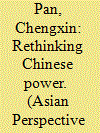

|
|
|
|
|
| Publication |
2014.
|
| Summary/Abstract |
A growing body of literature has focused on an alleged "power shift" from the United States to China (and from the West to the East more generally). For all its complexities and nuances, much of this power-shift literature continues to unreflectively hold onto a conventional way of conceptualizing power as a type of quantitatively measurable and zero-sum property possessed by the state. Without critically engaging with the conceptual question of what power means, however, the power-shift debate is both inadequate and misleading. Drawing on some alternative ways of conceptualizing power, I aim to illustrate the contingent and socially constructed nature of "Chinese" economic power and, in doing so, problematize the widely held view of a US-China power shift. I contend that insofar as power is socially constructed, how it is conceptualized matters for international relations. The need to rethink power is at the core of building a new type of major power relationship.
|
|
|
|
|
|
|
|
|
|
|
|
|
|
|
|
| 11 |
ID:
118892
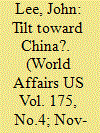

|
|
|
|
|
|
|
|